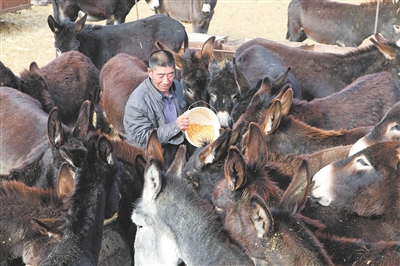Master of Tsinghua University went back to the mountains to raise sheep and chickens.
"these cases are for Beijing and these cases are for Shanghai." On the morning of December 15, Jingqi, a thin, bespectacled man, said to the courier in Yexian e-commerce industrial park.
The package contains split mutton, all produced by Jingqi's farm. The chickens on the farm are scattered in the mountains, the cattle pace leisurely, and the lambs are sprinkled with joy. "is it like a pure natural animal to keep in good health?" Jingqi asked.
Jingqi is a native of Yeyi Town, Ye County. He is a master student majoring in communications engineering at Tsinghua University. He used to be the director of a telecom network department with an annual salary of several hundred thousand yuan. His wife is a graduate student from Renmin University of China. The two originally had a house and a car in Beijing and lived a comfortable life.
In 2013, Jingqi resolutely decided to go back to his hometown to engage in green farming. He saw that people yearn for green food, and his hometown is in the mountains, with unique natural conditions. In the natural village of Daoguquan, Youfangtou Village, Xiali Township, he chose the ideal site.
However, the road to success is not plain sailing. In 2014, Yexian County suffered the worst drought in decades, the peanut grain on the farm was not harvested, the survival rate of chickens was less than 30%, and plateau sheep died one after another because they did not adapt to the local climate; in 2015, a rare storm and hail disaster lifted the sheep shed to a hillside hundreds of meters away.
Each blow prompted Jingqi to grow. He chose the breeding mode of the combination of captivity and stocking. The farm bought straw as feed, used self-produced sheep manure as fertilizer, and bought earthworms to decompose sheep manure as fertilizer for Hawthorn, apple and other fruit trees. Earthworms became protein-rich food for firewood chickens after breeding. In order to avoid large-scale use of antibiotics, he also asked traditional Chinese medicine to add dandelion, Radix Isatidis and other Chinese herbal medicine to feed to improve the survival rate of chickens in the natural state.
Jingqi also uses e-commerce to sell products. They slaughtered the sheep to remove acid and sent them directly to customers through the online store. In addition, he also "moved" the farm into the mobile phone, through which consumers can watch the sheep eating and the chicken pecking insects in real time.
In Jingqi's online store, a native egg was sold for 3 yuan, and the price of mutton was generally higher than that of the surrounding market. Jingqi explained that their agricultural products are green products, mainly sold to first-tier cities, targeting middle and high-end consumers, using logistics for rapid distribution, which has been recognized by customers.
Last year, Jingqi farm sales of more than 2 million yuan, this year is expected to exceed 5 million yuan, can make a profit of more than 1 million yuan.
The farm also drives the people around them to shake off poverty and become rich. Villager Wang Gang raises chickens with him and now earns nearly 100000 yuan a year. Bai Xiaodan, a professional farmer in Xindian Town, provides him with more than 8000 firewood chickens and more than 200,000 native eggs every year.
Flos Sophorae, wild honey, wild yam. Jingqi bought these mountain products and wild vegetables from his hometown and sold them to first-tier cities. Today, the farm begins to discuss with farmers to cooperate in raising pigs and actively prepare for the establishment of farmers' professional cooperatives, so as to drive more farmers to shake off poverty and become rich.
Related
- A course of planting techniques and methods on how to grow carrots
- How to plant the latest tulips?
- Is it better to pick tea in the morning or in the afternoon? When is the best time for tea to be picked? what is the third or fifth tea?
- Launch Yuanxiao Happy combination Haocha + Tea Yuan healthy Taste
- Penghu Tourism "Fireworks 20 Parade with You"
- 2022 West Lake Happiness holds "Digital Revitalization Voucher" and draws iphone13 and laptop.
- Banqiao Fuzhou social houses are designed to change start-up combined with police elimination to create a safe and livable environment
- The convenient measure of "mechanical weeding" in Xinbei has been abused and the Agriculture Bureau has imposed heavy penalties on the illegal land consolidation.
- Changgeng University Joins Hands with Four Memory Factories to Rescue Memory Talent Shortage
- The list of Taiwan's top 100 MVP managers is listed by the Director-General of the Farmers' Association of Sanxia District.



